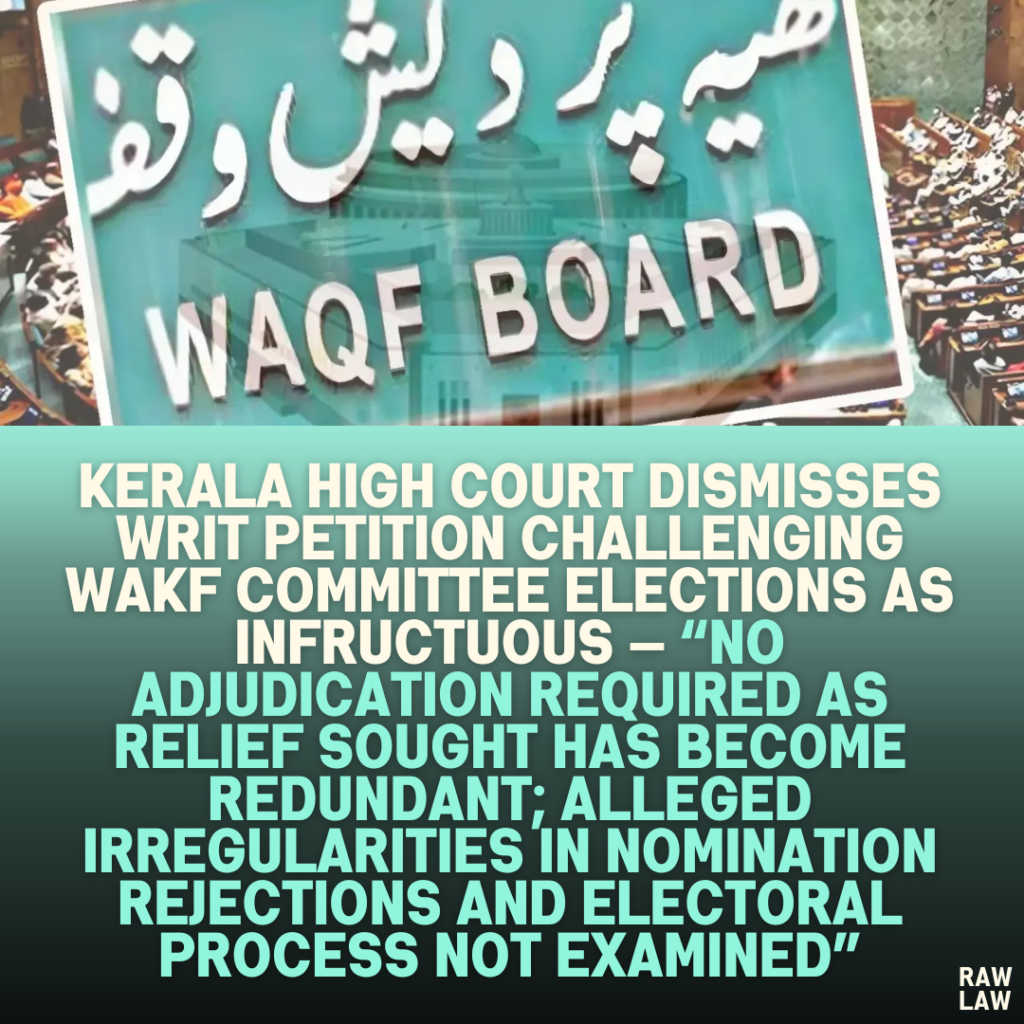Court’s Decision
The Division Bench of the Kerala High Court comprising Justice Amit Rawal and Justice Muralee Krishna S. dismissed the writ petition as infructuous. The petitioners had sought various directions concerning the election process of the Poyiloor Muslim Jama-ath Committee. However, at the hearing held on May 27, 2025, the counsel for the petitioners submitted that the matter had become infructuous. Accordingly, the Court recorded this statement and disposed of the matter without examining the merits.
“Today, when this matter is taken up for consideration, the learned counsel for the petitioner would submit that this matter has become infructuous. Accordingly, this writ petition is dismissed as infructuous.”
Facts
- The petitioners were members of the Poyiloor Muslim Jama-ath.
- They challenged the electoral process for electing the Jama-ath Committee and objected to the rejection of their nomination papers.
- Various proceedings had taken place before the Wakf Tribunal and the Kerala State Wakf Board.
- The petitioners sought relief from the High Court to intervene in the alleged irregularities concerning election scheduling, voters list preparation, nomination scrutiny, and rejections.
Issues
- Whether the election process undertaken by the Returning Officer and overseen by the Wakf Board was conducted in violation of the rules or bylaws of the Jama-ath.
- Whether the rejection of nomination papers of the petitioners was arbitrary or violative of the principles of natural justice.
- Whether the High Court should intervene under Article 226 of the Constitution in an election process regulated by the Wakf Board and Tribunal.
- Whether the petitioners’ grievances had been rendered infructuous due to the efflux of time or occurrence of subsequent events.
Petitioner’s Arguments
Although not elaborated during final hearing (since the petition was dismissed as infructuous), from the petition and annexures, the key allegations included:
- Improper scheduling of elections without adequate notice.
- Inadequate opportunity to file objections and nominate candidates.
- Rejection of nomination papers of all 11 petitioners on arbitrary grounds.
- Non-compliance with directions from the Wakf Tribunal and Wakf Board.
- Lack of transparency and failure to adhere to election guidelines.
The petitioners had relied on various exhibits, including:
- Bye-laws of the Jama-ath (Exh. P1),
- Wakf Board and Tribunal Orders (Exh. P2 & P3),
- Election notices and objections (Exh. P4–P13),
- Nomination rejections for each petitioner (multiple Exh. P12s).
Respondent’s Arguments
Though the case was ultimately not contested on merits, the respondents had submitted several documents indicating due compliance with election procedures, including:
- Notices published in daily newspapers (Mathrubhoomi).
- Adjournments granted for objections and voter list scrutiny.
- Final list of voters and guidelines issued.
- Approval sought from the Wakf Tribunal to proceed with elections.
They maintained that the process was conducted transparently and in accordance with law and the Wakf Board’s supervision.
Analysis of the Law
As the case was disposed of on grounds of infructuousness, no detailed legal analysis was undertaken by the Court in the present judgment. However, from the pleadings and procedural backdrop, the case touched upon:
- Jurisdiction of the High Court under Article 226 in relation to election processes governed by statutory tribunals.
- Autonomy of Wakf institutions and oversight by the Wakf Board and Tribunal.
- Procedural safeguards in conducting elections in religious institutions and fair opportunity to contest.
Precedent Analysis
No judicial precedents were analysed in the order itself as the matter was not decided on merits. However, issues of similar nature in past cases have often involved scrutiny of:
- Fairness in election to religious and charitable institutions.
- Scope of judicial review in the face of alternative remedies under statutory frameworks like the Wakf Act.
Court’s Reasoning
The Court did not enter into adjudication of any of the issues raised in the writ petition. It simply recorded the submission of the petitioner’s counsel that the writ petition had become infructuous.
This implies that either:
- The elections were completed and petitioners no longer sought intervention,
- Or circumstances changed such that the reliefs were no longer necessary.
Conclusion
The writ petition was dismissed as infructuous without adjudication on merits. The Court did not issue any further directions, nor did it comment on the legality of the election process or the rejection of nominations.
Implications
- The dismissal leaves open the possibility that similar grievances in future elections must be pursued through timely legal action.
- The case underscores the importance of pursuing remedies promptly, especially in time-sensitive electoral matters.
- Since no ruling was made on the legality of the nomination rejection or election procedures, no binding precedent was created.
- Future petitioners in similar circumstances must ensure that relief is not rendered redundant by the time the matter comes up for hearing.
